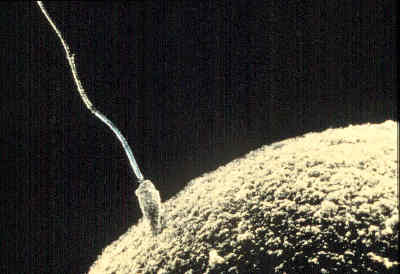Obesity has a reprogramming effect on a man's sperm DNA, explaining why a tendency to be overweight may run in families, scientists have shown this week. 
Children with obese fathers are more likely to become obese themselves. And while socioeconomic factors might be partly to blame, studies in animals show the same relationship, suggesting that some heritable mechanism is also at play to transmit overweight traits from fathers to their offspring.
Now, writing in Cell Metabolism, University of Copenhagen scientist Ida Donkin and her colleagues have confirmed that being obese produces reversible changes in the DNA message borne by sperm.
The team compared samples from 10 obese individuals with 13 lean controls. They found that the pattern of chemical - or epigenetic - markers, called methyl groups, which control the activity of the genes they are attached to, were consistently different between the normal weight and overweight subjects.
Principally affected were genes concerned with the development and function of the nervous system, as well as metabolism and appetite control. This was reflected in changes in the levels of signals called short non-coding RNAs (sncRNA), which are responsible for controlling the activity of other genes in the DNA.
The levels of sncRNAs linked previously to energy intake were significantly different between the obese and normal individuals.
To explore whether these changes are reversible, next Donkin and her colleagues collected a series of samples of six patients undergoing gastric bypass operations for morbid obesity.
Samples collected from each of the patients before the procedure showed the same changes to their sperm DNA, with chemical alterations to genes linked to appetite and energy intake.
But samples collected as soon as 1 week after the procedure showed reversal of the changes, so the epigenetic profile of the sperm DNA resembled more the pattern seen in lean individuals.
These changes persisted for at least a year, showing that altered nutritional intake and weight loss influence sperm epigenetics.
At this stage, the scientists do not know how these changes come about, or whether these changes account for the heritable nature of obese between fathers and their offspring. Nonetheless the study should, the researchers say, "raise societal awareness of preconceptual behaviour."










Comments
Add a comment